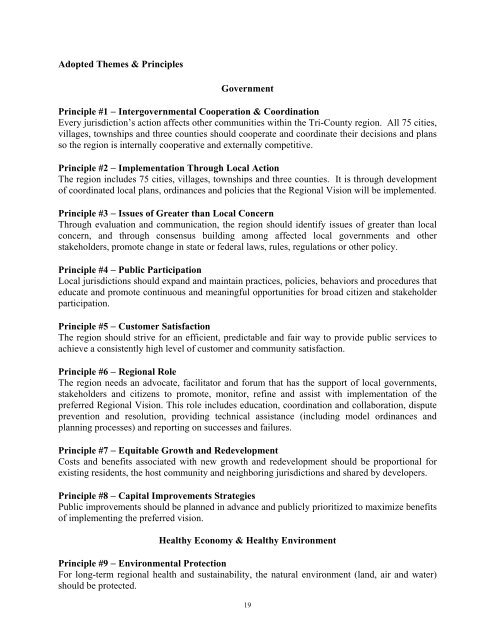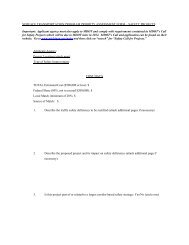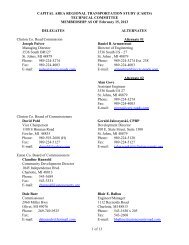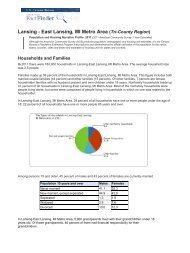Summary Report for the Lansing Metropolitan Area - Tri-County ...
Summary Report for the Lansing Metropolitan Area - Tri-County ...
Summary Report for the Lansing Metropolitan Area - Tri-County ...
You also want an ePaper? Increase the reach of your titles
YUMPU automatically turns print PDFs into web optimized ePapers that Google loves.
Adopted Themes & Principles<br />
Government<br />
Principle #1 − Intergovernmental Cooperation & Coordination<br />
Every jurisdiction’s action affects o<strong>the</strong>r communities within <strong>the</strong> <strong>Tri</strong>-<strong>County</strong> region. All 75 cities,<br />
villages, townships and three counties should cooperate and coordinate <strong>the</strong>ir decisions and plans<br />
so <strong>the</strong> region is internally cooperative and externally competitive.<br />
Principle #2 − Implementation Through Local Action<br />
The region includes 75 cities, villages, townships and three counties. It is through development<br />
of coordinated local plans, ordinances and policies that <strong>the</strong> Regional Vision will be implemented.<br />
Principle #3 − Issues of Greater than Local Concern<br />
Through evaluation and communication, <strong>the</strong> region should identify issues of greater than local<br />
concern, and through consensus building among affected local governments and o<strong>the</strong>r<br />
stakeholders, promote change in state or federal laws, rules, regulations or o<strong>the</strong>r policy.<br />
Principle #4 − Public Participation<br />
Local jurisdictions should expand and maintain practices, policies, behaviors and procedures that<br />
educate and promote continuous and meaningful opportunities <strong>for</strong> broad citizen and stakeholder<br />
participation.<br />
Principle #5 − Customer Satisfaction<br />
The region should strive <strong>for</strong> an efficient, predictable and fair way to provide public services to<br />
achieve a consistently high level of customer and community satisfaction.<br />
Principle #6 − Regional Role<br />
The region needs an advocate, facilitator and <strong>for</strong>um that has <strong>the</strong> support of local governments,<br />
stakeholders and citizens to promote, monitor, refine and assist with implementation of <strong>the</strong><br />
preferred Regional Vision. This role includes education, coordination and collaboration, dispute<br />
prevention and resolution, providing technical assistance (including model ordinances and<br />
planning processes) and reporting on successes and failures.<br />
Principle #7 − Equitable Growth and Redevelopment<br />
Costs and benefits associated with new growth and redevelopment should be proportional <strong>for</strong><br />
existing residents, <strong>the</strong> host community and neighboring jurisdictions and shared by developers.<br />
Principle #8 − Capital Improvements Strategies<br />
Public improvements should be planned in advance and publicly prioritized to maximize benefits<br />
of implementing <strong>the</strong> preferred vision.<br />
Healthy Economy & Healthy Environment<br />
Principle #9 − Environmental Protection<br />
For long-term regional health and sustainability, <strong>the</strong> natural environment (land, air and water)<br />
should be protected.<br />
19






